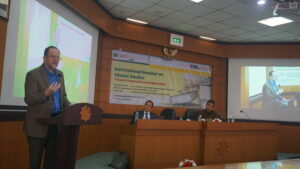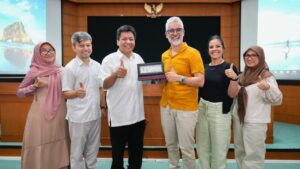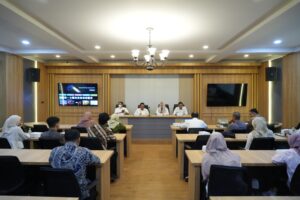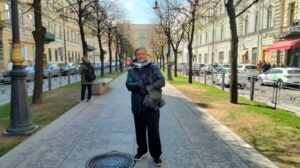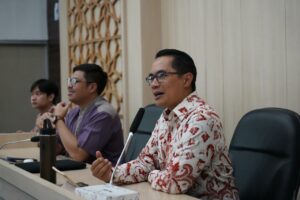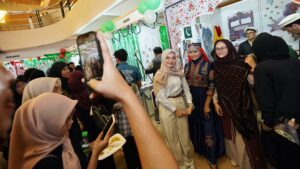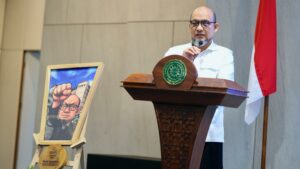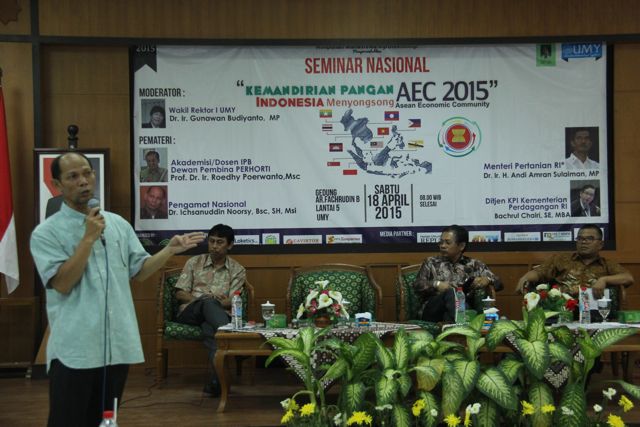
Welcoming ASEAN Economic Community (AEC), Indonesia ought to look for another way not to rely on import, particularly import of food issue, since agricultural land availability would decrease. On the other hand, population growth in the world elevates. The other issue is regarding uncertain weather which disrupts agricultural productivity.
Noticing the fact, a supervisor board of Indonesian Horticultural Association (PERHOTI) Prof. Dr. Ir. Roedy Poerwanto, M.Sc. and a national observer Dr. Ichsanuddin Noorsy, B.Sc., S.H., M.Si. agreed with not making food import as a solution to maintain food in Indonesia in confronting AEC 2015. Both contended that food import could not stand for long time to give Indonesian people prosperity. Additionally, a number of other solutions exist but import such as reducing need of rice consumption and substituting it by local food produced in modern way.
They uttered the aforementioned statement as a speaker of National Seminar “Indonesian Food Self-Sufficiency in Welcoming ASEAN Economic Community (AEC) 2015”. The seminar was organized by Agricultural Student Association, Faculty of Agriculture, Universitas Muhammadiyah Yogyakarta (UMY). It was conducted in meeting hall of A.R. Fachruddin B, Floor 5, UMY, on Saturday (18/4)/ Besides Prof. Dr. Ir. Roedy Poerwanto, M.Sc. and a national observer Dr. Ichsanuddin Noorsy, B.Sc., S.H., M.Si., the other speakers were Ir. Agus Supriatna Somantri, M.Sc. as a representative of Research and Development Association (Balidbang) of Agricultural Postharvest, and Muhammad Yani, S.H., M.M. as Sub-division of Foreign Trade Import, Ministry of Trade of RI.
Prof. Roedy elucidated that Indonesia is the third widest country of rice planting area, after India and China. Nevertheless, the rice productivity is number five in the world. The position of Indonesia in ASEAN level is below Vietnam. For the production, Indonesia is in the third position. “However, why does Indonesia import rice? For one reason, we consume too much rice. In fact, a Malaysian consumes 80 kg of rice a year. That is the reason why we are still lack of the food, especially of rice availability, while the area could not be expanded anymore,” he asserted.
Hence, according to the lecturer at Bogor Agricultural University, food self-sufficiency is still necessary and should be undertaken to Indonesian food security. He disagreed if Indonesia ought to receive advice of OECD (Organization for Economic Cooperation and Development). “For one reason, we could not hold on the import forever. Climate change and population in the world would be lifting so that food import could not be the solution for our country. Indonesia had better carry out food self-sufficiency. Additionally, it needs to reduce rice consumption and substitute it by another local food produced in modern way so that it would be more prestigious than rice,” he conveyed.
Moreover, Dr. Ichsanuddin argues that filling food need through import is one of the weak ways to bear inflation in Indonesia. Thus, if there is another country governing Indonesia and attacking the import aspect, Indonesia could go down. He thought that Indonesia does not need to rely on import to fill food need.
Ichsanuddin continued that, if Indonesia is willing to successfully face AEC 2015, food aspect should be reinforced. He contended that Indonesian food security is low in ASEAN level. Additionally, Indonesia ought to prepare capable human resources of agricultural field, and improve regional setting. “However, the crux is encouragement of state officials,” he emphasized.
The other solution was asserted by Ir. Agus Supriatna Somantri. He contended that, confronting AEC 2015, farmers should be prepared by agricultural mastery based technology because climate change is indeterminate and it would complicate the farmers. In addition, they are also required to be able to employ information technology applications. “They may not only be busy producing but also enhance their competitiveness with others. Therefore, good and skilled human resources could emerge from students so that there would be great ideas of how we could resolve the food issues in the future,” he mentioned.
Furthermore, Muhammad Yani, S.H., M.M. explained that the food import is materials for certain or special need. He stated that imported rice is the highest fraction of 25% for price stability, emergency prevention, poor people, and food insecurity. “Additionally, rice of Japonica, Bastami, Thai Hom Mali, Kukus, glutinous rice, 100% of cracked rice, and 100 % of cracked glutinous rice are employed for certain need as dietary, special consumption/certain segment, and industrial need. Hence, not all kinds of rice are imported. Only certain food which we could produce would be imported,” he elucidated.
